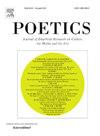你是认真的取消!取消文化中的双重过程、双重态度与道德虚伪
IF 2
2区 社会学
0 LITERATURE
引用次数: 0
摘要
本文通过双过程视角探讨了取消文化背后的认知过程,该视角区分了直觉(类型1)和反思(类型2)思维模式。通过对决策模式进行实验操作的调查实验,我们研究了关于移民和气候变化的政治不正确陈述如何影响取消决策。研究测量了对仇外心理和气候变化的显性和隐性态度,以了解它们对取消行为的影响。我们的研究结果表明,与直觉条件相比,政治不正确的陈述在反思条件下导致更高的取消率,明确的态度在反思决策中起着更大的作用。重要的是,内隐态度和外显态度的差异不仅塑造了决策模式的处理效果,而且揭示了道德虚伪的模式。在反思的条件下,个体经常取消他人以符合社会规范,即使他们的隐性态度与这些公开行为相冲突。这突出了取消文化中认知、社会规范和道德判断之间复杂的相互作用,反思性思维可能导致表演而不是真正的道德行为。本文章由计算机程序翻译,如有差异,请以英文原文为准。
Cancel like you mean it! dual processes, dual attitudes, and moral hypocrisy in cancel culture
This paper explores the cognitive processes underlying cancel culture through the lens of the dual-process perspective, which distinguishes between intuitive (Type 1) and reflective (Type 2) modes of thinking. Using a survey experiment with an experimental manipulation of decision-making mode, we examine how politically incorrect statements about immigration and climate change influence canceling decisions. Both explicit and implicit attitudes towards xenophobia and climate change were measured to understand their impact on canceling behaviors. Our findings show that politically incorrect statements lead to higher rates of canceling in the reflective condition compared to the intuitive condition, with explicit attitudes playing a stronger role in reflective decision-making. Importantly, the discrepancy between implicit and explicit attitudes not only shapes the treatment effect of decision-making mode but also reveals patterns of moral hypocrisy. Under reflective conditions, individuals often cancel others to conform to social norms, even when their implicit attitudes conflict with these public actions. This highlights the complex interplay between cognition, social norms, and moral judgment in cancel culture, where reflective thinking may lead to performative rather than genuine moral behavior.
求助全文
通过发布文献求助,成功后即可免费获取论文全文。
去求助
来源期刊

Poetics
Multiple-
CiteScore
4.00
自引率
16.00%
发文量
77
期刊介绍:
Poetics is an interdisciplinary journal of theoretical and empirical research on culture, the media and the arts. Particularly welcome are papers that make an original contribution to the major disciplines - sociology, psychology, media and communication studies, and economics - within which promising lines of research on culture, media and the arts have been developed.
 求助内容:
求助内容: 应助结果提醒方式:
应助结果提醒方式:


